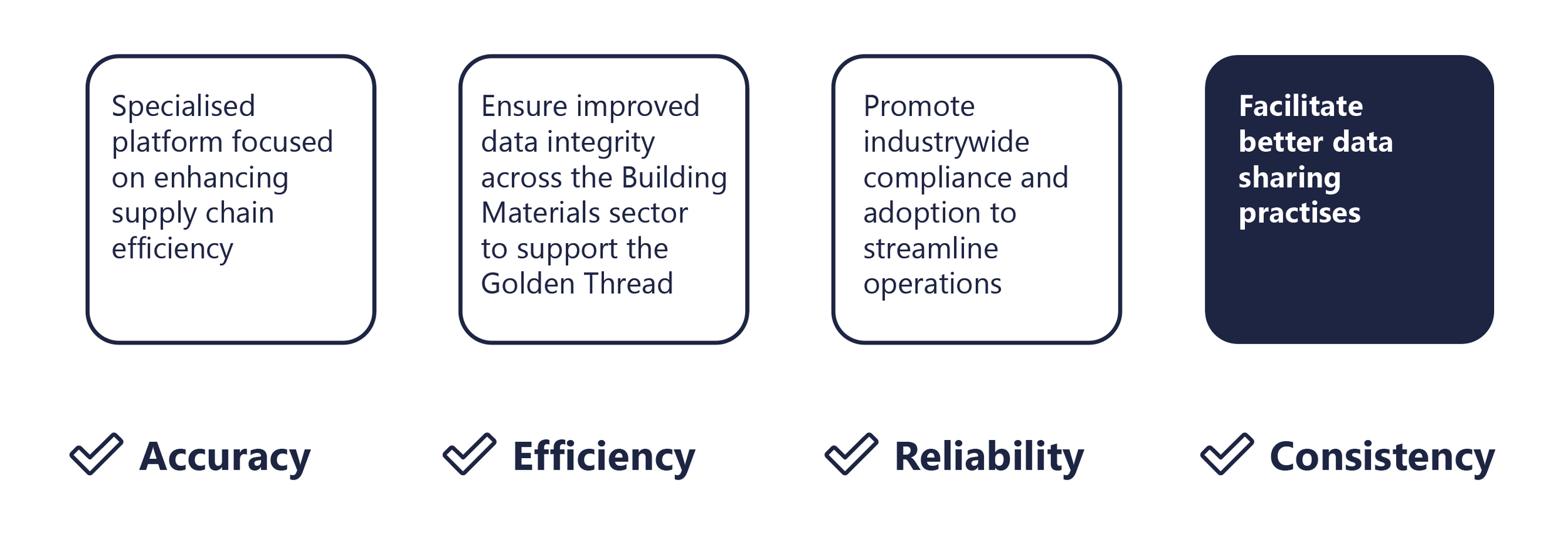Why Product Data Matters More Than Ever
The UK construction sector is undergoing a major regulatory and digital shift. Legislation like the Building Safety Act and initiatives such as the Golden Thread and CCPI are there to have a higher level of quality data and make it an operational priority.
Product data is now central to safety, compliance, procurement, and sustainability. Industry must shift from fragmented, manual processes to reliable, centralised data systems.
In the wake of Grenfell, we believe the UK Building Materials sector must change and that accurate, accessible product data is essential to building a safer, more accountable built environment, and future-ready industry.
The industry is facing a major shift, with legal and regulatory developments such as the Building Safety Act, alongside developing frameworks like the Golden Thread and voluntary codes such as CCPI, making product data an operational and, in some cases legal priority.
Today’s fragmented, manual systems aren’t sustainable with too much duplication, inconsistency, and inefficiency
Data Yard is the Building Materials sector’s collective response: a centralised platform for suppliers to manage product data once and share it everywhere. Built by the industry, for the industry.
Our Vision for Product Data
How it Works
Data Yard is managed by Building Materials Digial Services, created by BMF and NMBS, and governed by the industry
Suppliers upload their data once to the Data Yard.
Suppliers stay in control of their data; they approve who can access, view / download it.
Supplier product data is then accessible to all approved and supplier authorised users ranging from merchants, buying groups and the wider industry via a secure, standards-compliant platform.
Backed by proven tech ETIMIX by Omiteo (ProPlanet) with support for the industry led Product Data Standardisation template, ETIM and GS1.
Data Yard Core Principles
A digital platform for seamless product data exchange to provide a Single Source of Truth within the Building Materials sector.
Data Yard Data Quality and Governance Charter
The purpose of the Data Yard charter is to establish clear guidelines and expectations for the data quality and governance of the platform. By making data quality and governance a primary accountability for all users of Data Yard we aim to ensure the accuracy, reliability, and integrity of our data assets, enabling users to access trusted product data and driving commercial success.
Accountability: Each manufacturer is responsible for ensuring the product data they provide to Data Yard is accurate, complete, and up to date, and that internal processes support these quality standards.
Ownership: Manufacturers retain ownership of the product data they generate, and are expected to govern its lifecycle — from creation through to updates and withdrawal in line with Data Yard standards.
Collaboration: Collaboration between Manufacturers, Data Yard users, Data Yard employees, technology partners and regulators is essential to ensure effective data governance and quality management.
Continuous Improvement: Continuous monitoring, assessment, and improvement of data quality processes and practices are integral to maintaining high standards of data integrity.
Transparency: Clear communication and transparency regarding data quality standards, policies, and procedures are crucial to fostering a culture of data stewardship and accountability.
Charter Principles
Data Yard is committed to promoting responsible data governance that reflects ethical values and supports sustainability across the building materials sector.
Transparency: Data Yard customers are expected to share accurate, honest, and complete product information to support informed decisions by downstream users.
Equity: The Data Yard seeks to level the playing field for all sizes of manufacturers and merchants, ensuring fair access to trusted data and services, supporting all customers to implement or benefit from Data Yard governance practices.
Sustainability: Where possible, data practices should support the sector’s sustainability goals - such as including environmental product declarations (EPDs), circular economy attributes, and low-carbon product attributes.
Privacy & Fair Use: Data shared through Data Yard must be used in accordance with applicable data protection laws and must not be misused for anti-competitive or unethical practices.
Ethics & Sustainability Principles
Contact us
Have a question or want to know more about Data Yard?
Fill in the form and our team will get back to you as soon as possible.



